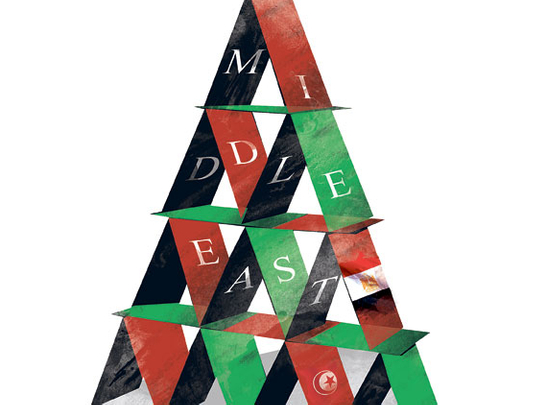
While I heartily congratulate the Egyptian people on achieving the impossible, I'm also a realist. There are many aspects to this revolution that may have negative implications for the entire region. Looking beyond the current euphoria, following the ousting of an out-of-touch leader and his corrupt capitalist cronies, I fear a jagged road lies ahead.
Let's move beyond the romanticism. It is one thing for people to successfully overthrow a government, but often they are no better off. Castro's Cuba is one example where a dictator was overthrown only to be replaced by another. The 1979 Iranian revolution, that sent the Shah packing, began as a secular uprising but was later hijacked by an ayatollah in exile. I suspect that many Cubans and Iranians long to turn back the clock. I hope the day doesn't come when Egyptians do the same.
Egypt is still celebrating but I fear that not everyone understands the pitfalls ahead. The nation is beset by strikes. The economy is said to be losing $300 million (Dh1.10 billion) daily and, according to some reports, capital flying out of the country is running into billions. What happens when the bourse opens is anyone's guess. Egyptians may dream that the billions alleged to have been systematically milked from the country and deposited abroad will return, but that's easier said than done.
No country on earth can prosper when it is being run on people power; even a corner shop needs a manager. As of now, the revolutionaries are holding their military rulers hostage instead of allowing the Supreme Council time to fulfil its undertakings. They have warned that if their demands are not met within their own time table they will bring Egypt to a standstill.
Those threats can go two ways. Either a loose coalition of inexperienced youth organisations holding a Sword of Damocles will become the de facto rulers or the military will lose patience and impose a strict crackdown that could result in a bloodbath. No group should hold a country's leadership to ransom. Now that the ‘people power' genie is out of the bottle can any future leader stuff it back?
Without effective authority, Egypt will become irrevocably destabilised. Weakening the mother of the Arab world could be part of a neoconservative conspiracy to enable Israel to get back the oil and gas-rich Sinai.
Iraq was destroyed by lies. Sudan has been split in two. Is Egypt next on the list, followed by the Arab heartlands of Yemen, Algeria, Morocco, Syria, Saudi Arabia and certain Gulf countries, such as Bahrain, where Shiites are attempting to ride on the back of Egypt's revolution?
UAE system works
The thinking is that oil-rich Saudi Arabia and Gulf Cooperation Council countries, where citizens enjoy a good standard of living, are less vulnerable to the domino effect but they are not immune to troublemakers. I'm a great admirer of the UAE's hybrid federal system of governance, allowing each of the seven emirates autonomy while respecting people's traditional allegiances to their respective ruler. It works seamlessly as it is. However, there are Arab states that do need to modernise, allow their people a greater say and listen to their just grievances. Dictatorial dinosaurs have no place in today's world.
It is generally believed that Egypt's revolution was spontaneous. But, as Wael Ghonim and his associates in the April 6 movement have confirmed, it was long planned using learned Eastern European tactics. Ghonim seems overwhelmed by his celebrity status. He says all he wants to do is return to his job. The clamouring agenda-driven satellite channels should let him do just that and quit whipping up emotions to attract viewers.
I believe the intentions of those youngsters were honest. But I can't help suspecting that they have naively allowed themselves to be manipulated by foreign powers, keen to see the region in disarray. Tehran has strongly backed the revolution which it has wrongly characterised as an ‘Islamic Revolution' and Washington is cheering it on even as three troop-filled US warships are moored off Alexandria and Israel has placed its military on high alert.
The biggest question is what happens now on Egypt's political front?
I'm enthusiastic about democratic principles but it is unrealistic to expect a western-style democracy to emerge overnight in a country that has never experienced it and where the military has been all powerful for almost 60 years. Egypt requires a firm hand at the rudder until such time as democratic values can be absorbed into its culture. Any democratic system hurriedly crafted now will be a sham.
Egypt should postpone parliamentary elections and concentrate on electing a secular progressive president with a mandate to form a government that should include charismatic popular figures, capable of beating back the Muslim Brotherhood, which has announced its intention to become a political party.
Worse, Iran is building up its strength to become the region's most powerful player. Tehran is already gloating over its success in certain areas. Should Arab nations implode like a house of cards due to the Tunisian/Egyptian contagion, the winners will be Tehran, Tel Aviv and Washington, whose Middle-Eastern influence derives from the principle of ‘divide and conquer'.
If the Middle East wasn't a coveted location due to its natural resources or wasn't such a hotbed of competing sectarian interests, Iranian spies, CIA spooks and Mossad agents, I might be less troubled. Our leaders must coordinate to decisively act to stem this whirlwind before it consumes us. Unless we become masters of our own destiny soon the malevolent elements, burning to become our masters, will prevail. It's ironic that while people in city squares are calling for freedom, we have never been this close to being enslaved.
Khalaf Al Habtoor is a businessman and chairman of Al Habtoor Group.









